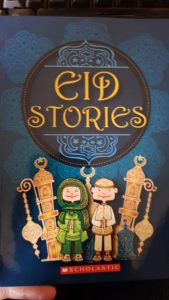Eid Stories
 Today is Eid-ul-Fitr celebrated after a month of Ramzan. Scholastic India published a slim collection of stories to celebrate the festival called Eid Stories. New stories commissioned by established writers like Paro Anand, Siddhartha Sarma, Adithi Rao, Rukhsana Khan, Shahrukh Husain, Devashish Makhija, Samina Mishra and Lovleen Misra. Every single story is extraordinarily powerful.
Today is Eid-ul-Fitr celebrated after a month of Ramzan. Scholastic India published a slim collection of stories to celebrate the festival called Eid Stories. New stories commissioned by established writers like Paro Anand, Siddhartha Sarma, Adithi Rao, Rukhsana Khan, Shahrukh Husain, Devashish Makhija, Samina Mishra and Lovleen Misra. Every single story is extraordinarily powerful.
Paro Anand’s “After that, in Mumbai” is a devastating story about a young boy Ayub being attacked by his classmates for being a Muslim, a terrorist, who is out to kill everyone. This violence broke out after the Mumbai blasts. His parents are appalled given that his father is the Muslim and his mother is a Christian so brought their son up in a secular environment. So with the willing help of the school administration they speak to the class to sensitize them about Islam and invite everyone home to celebrate Eid.
Adithi Rao’s “Sweets for Shankar” is a heartbreaking story about the friendship of twelve-year-olds Munna and Shankar set against the backdrop of Partition. The boys work together as apprentices in a shoe shop but it is all abandoned and Munna is asked to stop working by his master since riots have broken out. Even though it is more than seven decades after Independence these stories are very painful to read as the communal violence persists in India.
Award-winning filmmaker Devashish Makhija’s “Red 17: An Eid Story” is a compelling read about an ex-policeman Nandu who became deaf in a bomb blast. He lost his wife in the terrorist attack. He now works as an assistant in a laundromat owned by Liayqat as he has to pay for his son’s education. While at work he is asked to return the coat of a customer Feroze Aslam in time for Eid. Unfortunately when he goes to Feroze’s house Nandu discovers that Feroz has died. Shocked he goes home where he decides to keep the smart coat, resize it and gift it to his son, Baiju. Few days later he is stricken by guilt and goes to return it to Feroze’s widow who very calmly asks Nandu to keep the coat. She said it was her husband’s wish. It may have been written years ago but it is a fitting milestone in Devashish Makhija’s oeuvre which consists of short stories, picture books and short films like Agli Baar that have a recurring theme of communal violence.
Inevitably all the stories in Eid Stories celebrate the joyous festival while introducing tough topics for children such as prejudice, and bigotry. These stories were first published in 2010 but nearly a decade later they continue to be relevant, perhaps more today than before. The violence in India is rampant and tearing apart its democratic and secular fabric. Children may as well learn early that ethnic violence is not acceptable; India is to be celebrated for its diversity and inclusiveness!
Perhaps it is fitting on this day that Rahul Pandita posted his grief-stricken message on Eid for journalist Shujat Bukhaari who was slain on the eve of Eid in Srinagar. This message is even more poignant as they belong to different communities in a state that has been ravaged by terrible ethnic violence for decades. Rahul Pandita is a Kashmiri Pandit and the late Shujat Bukhaari was a Kashmiri Muslim.
As Badi Ammi wisely advises her grandchildren in Lovleen Misra’s short story that the spirit of Eid is to be applied to life: In giving to others, you give to yourself . . . Keep giving.
Eid Stories Scholastic India, Gurgaon, India, 2010. Rpt. 2018. Pb. pp. 114 Rs. 195
16 June 2018
